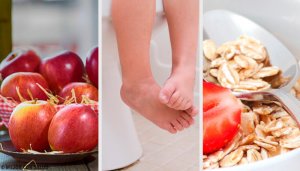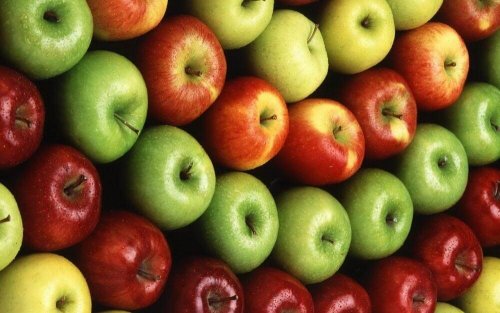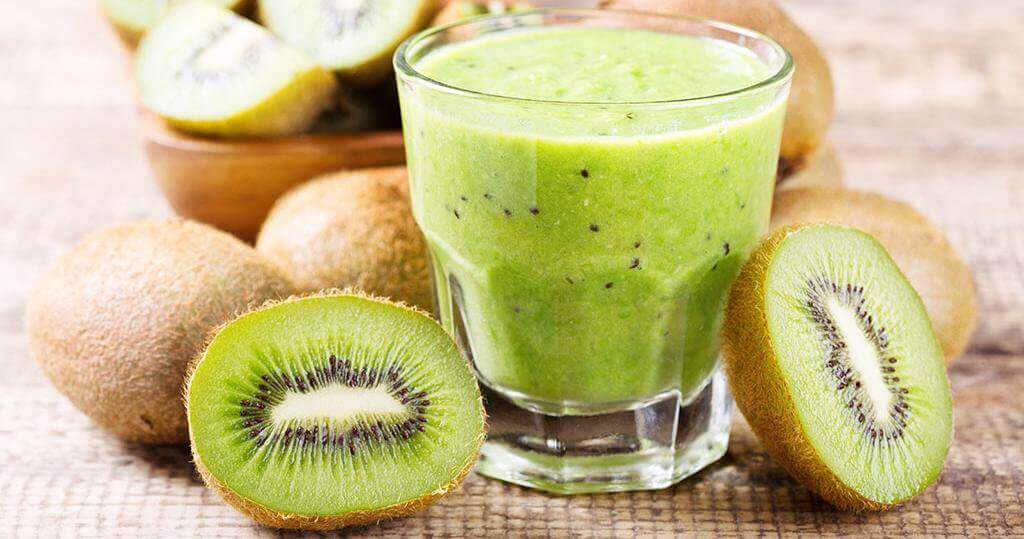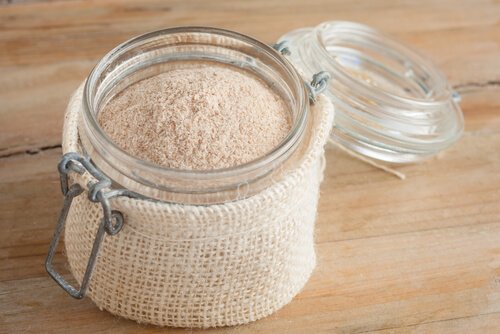13 Home Remedies for Constipation in Children


Reviewed and approved by the doctor Maricela Jiménez López
Constipation in children shouldn’t be treated with the conventional laxatives that adults take.
These drugs have an irritating effect on the intestine that can impair its function, especially if they’re abused at an early age.
In today’s article, we’ll give you 13 natural and home remedies for constipation in children that prevent no risks to their health.
Constipation in children
Constipation is a common problem in children, characterized by infrequent bowel movements and hard or dry stools. In addition, children may present any of these signs:
- Pain when evacuating the intestines.
- Less than 3 stools a week.
- Discomfort and abdominal pain.
- Traces of liquid or pasty stools in the underwear (a sign of fecal retention).
- Blood on the surface of hard stools.
- Because of the pain and discomfort, they may show signs of holding back the urge to go to the bathroom. For example, crossing their legs, squeezing their buttocks tightly, or contorting their bodies.
Many cases of childhood constipation aren’t serious and can be resolved with changes in diet and bathroom habits. However, other factors can’t be ruled out, such as emotional issues or a sedentary lifestyle.
If this problem persists and you don’t know the cause, you should visit the doctor as soon as possible so they can conduct the appropriate tests. In this way, any disease can be ruled out and appropriate treatment can be prescribed.
Home remedies to relieve constipation in children
As mentioned earlier, most of the time this problem can be solved at home with some simple steps and remedies.
1. Olive oil

A tablespoon of olive oil on an empty stomach is a foolproof treatment for constipation, as confirmed by a study conducted by the Federal University of São Paolo. Children often respond quickly to this simple habit that can be maintained for a few weeks until the problem is resolved.
- Extra virgin olive oil acts as a mild laxative and is a really healthy food that’s essential for a balanced diet.
- In addition to taking it on an empty stomach, you can also use it as a salad dressing.
Like this article? We also recommend you read: 5 Olive Oil Skin Treaments
2. Apples

Apples are fruits with a great deal of fiber, fructose, and sorbitol that can regulate your digestive function depending on how you eat them. This is confirmed in a study conducted by the researcher, Johnson W. McRorie.
- Your child should eat an apple in the morning with its peel to fight constipation. We recommend only buying organic apples, to avoid any pesticides.
3. Prunes
Prunes are another excellent mild laxative that helps naturally prevent constipation in children. A study conducted by Lodz University of Technology (Poland) confirms this fact.
Offer your child three to four prunes first thing in the morning along with their breakfast. You should hydrate them overnight with a little water. Another way to introduce them is in the form of juice, alone or mixed with apple juice if they don’t like the taste.
4. Kiwi

Kiwi is another fruit that’s extremely beneficial for healthy intestinal function. Many people eat kiwis every morning to facilitate bowel function thanks to their fiber and enzyme content.
- Kiwis can be eaten alone or combined with apples and plums for a delicious and nutritious smoothie that your child will love.
5. Flaxseed
Flaxseed is a well-known treatment for constipation. Just remember that you must soak the seeds in water overnight first.
- As the seeds soak, they release soluble fiber, known as mucilage.
- In the morning, your child should drink both the seeds and the water. It’s safer to use crushed seeds.
- You can also add it to oatmeal for breakfast, or mix it with yogurt or fruit. In this way, the gelatinous consistency of the preparation won’t be so noticeable.
Children should take half a teaspoon a day. This amount shouldn’t be exceeded and it’s essential that they drink enough water.
6. Chia seeds
Chia seeds work in the same way as flaxseed, as this study conducted by the University of Veterinary and Animal Sciences in Lahore (Pakistan) confirms.
- When you soak them in water, they release fiber.
- This generates action in the digestive tract without irritating the intestine.
You might also like to read: 8 Amazing Benefits of Chia Seeds
7. Lemon juice

A glass of warm water with the juice from half a lemon relaxes the digestive tract and increases bowel movements. This is one of the simplest and most natural treatments for constipation in children.
Ingredients
- 1 cup of water (200 ml).
- The juice of 1 lemon.
Method
- Heat the water to a comfortable temperature and add the lemon juice.
- Drink the mixture on an empty stomach.
8. Honey
Honey has a mild laxative effect and also reduces inflammation in the intestine. Therefore, it can be included among the effective measures for the treatment of constipation. However, it shouldn’t be given to children under 2 years of age.
9. Oats
Oatmeal is one of the cereals richest in fiber and is an ideal option for children with constipation. Whole grains are foods that can improve both the consistency and frequency of stools. They can be added to soups, broths, stews, biscuits, cookies, smoothies, etc.
According to data from a study published in the Journal of Medicinal Food, the consumption of oats in children aged between 7 to 12 years for two weeks improved some gastrointestinal symptoms such as the sensation of incomplete evacuation.
10. Psyllium

Psyllium is a seed husk that has a balancing effect on the intestine. It’s a laxative supplement that adds fluid and bulk to stool.
It can be added to children’s meals. However, the use of this type of product in children isn’t recommended without first consulting a health professional.
11. Water
If fiber consumption is increased, children must also drink more water to digest it well and ensure that it has the desired effects on gastrointestinal transit.
You must ensure that your child drinks water throughout the day. In fact, dehydration can also be a cause of constipation in children, as confirmed by this study conducted by the Nestlé Water Institute.
12. Massage
Gently massaging the child’s abdomen relaxes the muscles and helps stimulate intestinal activity. At night, when they go to bed, give them a few rubs on their belly. It’s important that you follow the path of the intestine.
- Start above their right groin.
- Go below the ribs.
- Go to the ribs on the left side.
- Move down to the left groin.
13. Changes in routine when going to the bathroom
Changing patterns and behaviors related to evacuation can improve constipation problems in children. Getting them used to going to the bathroom after meals can be the first step toward establishing a positive routine.
If you’re in the process of potty training your child, and constipation appears, it may be preferable to wait for it to pass before completely removing the diaper.
We think you may also like to read this article: Say Goodbye to Constipation with These 8 Fruit Smoothies
Some more advice for treating constipation in children
Diet and bathroom habits are two of the mainstays in the treatment and improvement of this problem. However, they must also be based on other healthy practices.
- It’s essential that children have an active life and that they exercise and play outdoors.
- Fiber is an important component of the diet but it must be offered as part of a balanced and complete diet that also contains sufficient fat and protein.
- Some foods aren’t recommended in this situation. For example, it’s advisable to avoid excess milk and fruit juices as well as carbonated drinks, fast food, and fried foods.
All the remedies that we’ve mentioned here are effective in improving and solving (in some cases) this problem without the need to use medications, suppositories, or enemas.
That said, you should be aware of some signs that would require immediate consultation with your doctor. These are fever, lack of appetite, weight loss, blood in the stool, abdominal swelling, pain when evacuating, or rectal prolapse.
Constipation in children can improve with some home remedies
Infrequent bowel movements or hard stools can be common among children. Many times they’re due to changes in diet or difficulties in toilet training.
In most cases, it’s usually temporary and improves with a change in diet, proper hydration, and physical activity. However, to avoid complications and rule out more serious problems, be sure to consult your pediatrician.
All cited sources were thoroughly reviewed by our team to ensure their quality, reliability, currency, and validity. The bibliography of this article was considered reliable and of academic or scientific accuracy.
- Arnaud M. J. Mild dehydration: a risk factor for constipation? European Journal of Clinical Nutrition. Diciembre 2003. Suppl 2: S88-95.
- Gibas-Dorna M, Piatek J. Funcional constipation in children – evaluation and management. Przeglad Gastroenterologiczny. 2014. 9 (4): 194-199.
- Mayo Clinic. Estreñimiento en niños. Septiembre 2021.
- Milala J, Kosmala M, et al. Plum pomaces as a potential source of dietary fibre: composition and antioxidant properties. Journal of Food Science and Technology. Octubre 2013. 50 (5): 1012-1017.
- National Institute of Diabetes and Digestive and Kidney Diseases. Tratamiento para el estreñimiento en los niños. Mayo 2018.
- Paruzynski H, Korczak R, et al. A pilot and feasability study of oatmeal consumption in children to assess markers of boewl function. Journal of Medicinal Food. Mayo 2020. 23 (5): 554-559.
- Sun J, Bai H, et al. Effects of flaxseed supplementation on functional constipation and quality life in a Chinese population: a randomized trial. Asia Pacific Journal of Clinical Nutrition. 2020. 29 (1): 61-67.
- Ullah R, Nadeem M, et al. Nutritional and therapeutic perspectives of Chia (Salvia hispanica L.): a review. Journal of Food Science and Technology. Abril 2016. 53 (4): 1750-1758.
- The Royal Children Hospital Melbourne. Constipation. Agosto 2020.
This text is provided for informational purposes only and does not replace consultation with a professional. If in doubt, consult your specialist.








